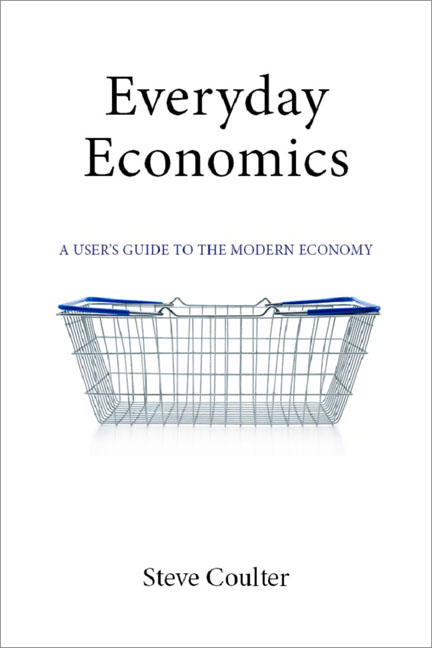Book contents
- Frontmatter
- Contents
- Preface and Acknowledgements
- 1 Economics: What is it Good For?
- 2 Knowledge is Power: Education and Training
- 3 Let’s Get Busy: Work and Occupations
- 4 Get Well Soon: Health and Healthcare
- 5 Making the World Go Around: Money, Banking and Personal Finance
- 6 Home Sweet Home: The Housing Market
- 7 Shop Till You Drop: Shopping and Consumption
- 8 From Cradle to Grave: Benefits and Welfare
- Index
1 - Economics: What is it Good For?
Published online by Cambridge University Press: 09 August 2023
- Frontmatter
- Contents
- Preface and Acknowledgements
- 1 Economics: What is it Good For?
- 2 Knowledge is Power: Education and Training
- 3 Let’s Get Busy: Work and Occupations
- 4 Get Well Soon: Health and Healthcare
- 5 Making the World Go Around: Money, Banking and Personal Finance
- 6 Home Sweet Home: The Housing Market
- 7 Shop Till You Drop: Shopping and Consumption
- 8 From Cradle to Grave: Benefits and Welfare
- Index
Summary
Introduction
It must have been a fairly toe-curling moment. Opening a new academic building at the London School of Economics and Political Science (LSE) in 2008, as the financial crisis was raging unchecked, Queen Elizabeth II asked her academic host a cutting question: “Why did none of you see this coming?” Her Majesty’s comment, and the awkward embarrassment with which it was greeted, was reported around the world as an emblem of the inability of the economics profession to prepare the world for disaster.
Were these accusations fair? Yes and no. No, because economists are not omniscient and, the mini-industry of economic forecasting notwithstanding, cannot predict the future. The claim of economists that they are (social) scientists is often mocked by “real” scientists studying applied natural phenomena, as opposed to the behaviour of unruly human beings. Yet some of these are equally poor at making predictions about disruptive occurrences in their own realms: seismologists cannot predict earthquakes; meteorologists can make reliable weather forecasts only for the next few days; and so on.
But, on the other hand, yes; because the financial crisis was an extraordinary event that shook the discipline of economics to its core, exposed some of its central tenets as wishful thinking and revealed a stunning level of complacency on the part of leading members of the profession, including highly paid analysts in government and financial institutions. Among the most searing criticisms was that modern economics was addicted to abstract theorizing and thereby irrelevant to the everyday concerns of ordinary mortals. This was not merely sniping from the sidelines. Leading economists and financial insiders felt the same way. Just before he quit his job, the president of the European Central Bank (ECB), Jean-Claude Trichet, complained in exasperation that, “as a policymaker during the crisis, I found the available [economic and financial] models of limited help. In fact, I would go further: in the face of the crisis, we felt abandoned by conventional tools.”
The crisis and its aftermath have prompted much soul-searching among economists, as well as ridicule from many commentators (although applications to university economics courses shot up).
- Type
- Chapter
- Information
- Everyday EconomicsA User's Guide to the Modern Economy, pp. 1 - 26Publisher: Agenda PublishingPrint publication year: 2017

